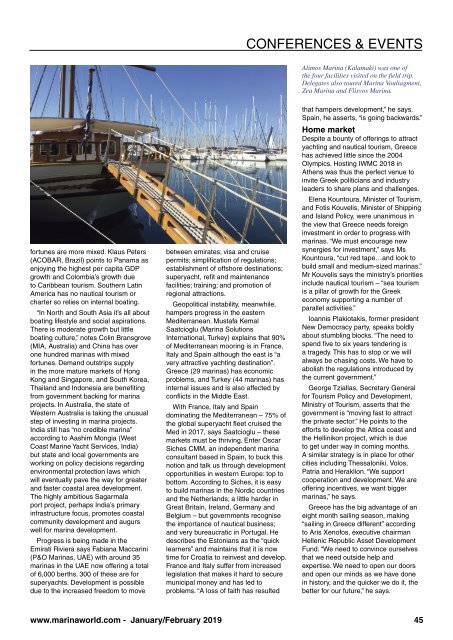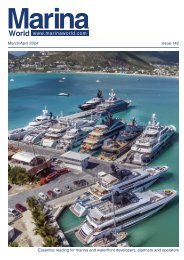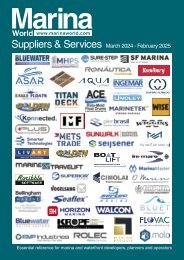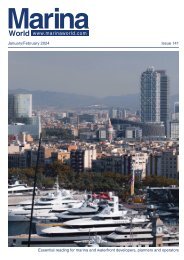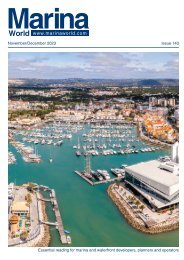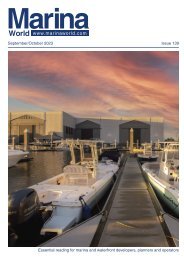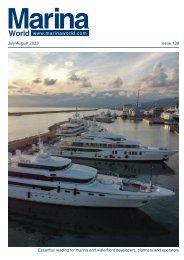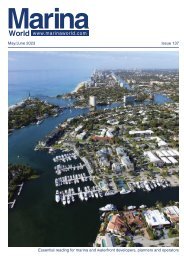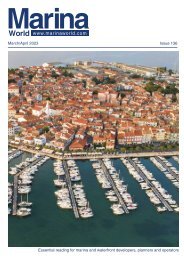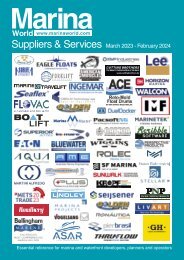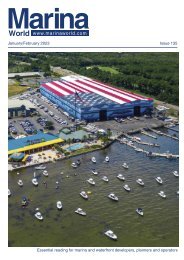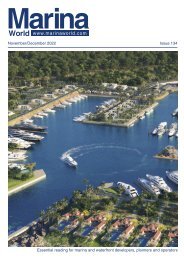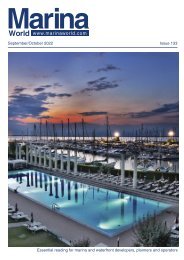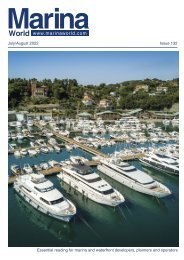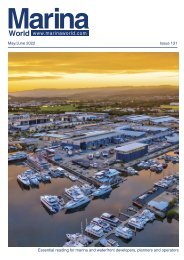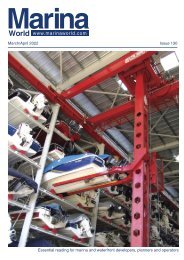January February 2019 Marina World
The magazine for the marina industry
The magazine for the marina industry
You also want an ePaper? Increase the reach of your titles
YUMPU automatically turns print PDFs into web optimized ePapers that Google loves.
CONFERENCES & EVENTS<br />
Alimos <strong>Marina</strong> (Kalamaki) was one of<br />
the four facilities visited on the field trip.<br />
Delegates also toured <strong>Marina</strong> Vouliagmeni,<br />
Zea <strong>Marina</strong> and Flisvos <strong>Marina</strong>.<br />
fortunes are more mixed. Klaus Peters<br />
(ACOBAR, Brazil) points to Panama as<br />
enjoying the highest per capita GDP<br />
growth and Colombia’s growth due<br />
to Caribbean tourism. Southern Latin<br />
America has no nautical tourism or<br />
charter so relies on internal boating.<br />
“In North and South Asia it’s all about<br />
boating lifestyle and social aspirations.<br />
There is moderate growth but little<br />
boating culture,” notes Colin Bransgrove<br />
(MIA, Australia) and China has over<br />
one hundred marinas with mixed<br />
fortunes. Demand outstrips supply<br />
in the more mature markets of Hong<br />
Kong and Singapore, and South Korea,<br />
Thailand and Indonesia are benefiting<br />
from government backing for marina<br />
projects. In Australia, the state of<br />
Western Australia is taking the unusual<br />
step of investing in marina projects.<br />
India still has “no credible marina”<br />
according to Aashim Mongia (West<br />
Coast Marine Yacht Services, India)<br />
but state and local governments are<br />
working on policy decisions regarding<br />
environmental protection laws which<br />
will eventually pave the way for greater<br />
and faster coastal area development.<br />
The highly ambitious Sagarmala<br />
port project, perhaps India’s primary<br />
infrastructure focus, promotes coastal<br />
community development and augurs<br />
well for marina development.<br />
Progress is being made in the<br />
Emirati Riviera says Fabiana Maccarini<br />
(P&O <strong>Marina</strong>s, UAE) with around 35<br />
marinas in the UAE now offering a total<br />
of 6,000 berths. 300 of these are for<br />
superyachts. Development is possible<br />
due to the increased freedom to move<br />
between emirates; visa and cruise<br />
permits; simplification of regulations;<br />
establishment of offshore destinations;<br />
superyacht, refit and maintenance<br />
facilities; training; and promotion of<br />
regional attractions.<br />
Geopolitical instability, meanwhile,<br />
hampers progress in the eastern<br />
Mediterranean. Mustafa Kemal<br />
Saatcioglu (<strong>Marina</strong> Solutions<br />
International, Turkey) explains that 90%<br />
of Mediterranean mooring is in France,<br />
Italy and Spain although the east is “a<br />
very attractive yachting destination”.<br />
Greece (29 marinas) has economic<br />
problems, and Turkey (44 marinas) has<br />
internal issues and is also affected by<br />
conflicts in the Middle East.<br />
With France, Italy and Spain<br />
dominating the Mediterranean – 75% of<br />
the global superyacht fleet cruised the<br />
Med in 2017, says Saatcioglu – these<br />
markets must be thriving. Enter Oscar<br />
Siches CMM, an independent marina<br />
consultant based in Spain, to buck this<br />
notion and talk us through development<br />
opportunities in western Europe: top to<br />
bottom. According to Siches, it is easy<br />
to build marinas in the Nordic countries<br />
and the Netherlands; a little harder in<br />
Great Britain, Ireland, Germany and<br />
Belgium – but governments recognise<br />
the importance of nautical business;<br />
and very bureaucratic in Portugal. He<br />
describes the Estonians as the “quick<br />
learners” and maintains that it is now<br />
time for Croatia to reinvest and develop.<br />
France and Italy suffer from increased<br />
legislation that makes it hard to secure<br />
municipal money and has led to<br />
problems. “A loss of faith has resulted<br />
that hampers development,” he says.<br />
Spain, he asserts, “is going backwards.”<br />
Home market<br />
Despite a bounty of offerings to attract<br />
yachting and nautical tourism, Greece<br />
has achieved little since the 2004<br />
Olympics. Hosting IWMC 2018 in<br />
Athens was thus the perfect venue to<br />
invite Greek politicians and industry<br />
leaders to share plans and challenges.<br />
Elena Kountoura, Minister of Tourism,<br />
and Fotis Kouvelis, Minister of Shipping<br />
and Island Policy, were unanimous in<br />
the view that Greece needs foreign<br />
investment in order to progress with<br />
marinas. “We must encourage new<br />
synergies for investment,” says Ms<br />
Kountoura, “cut red tape…and look to<br />
build small and medium-sized marinas.”<br />
Mr Kouvelis says the ministry’s priorities<br />
include nautical tourism – “sea tourism<br />
is a pillar of growth for the Greek<br />
economy supporting a number of<br />
parallel activities.”<br />
Ioannis Plakiotakis, former president<br />
New Democracy party, speaks boldly<br />
about stumbling blocks. “The need to<br />
spend five to six years tendering is<br />
a tragedy. This has to stop or we will<br />
always be chasing costs. We have to<br />
abolish the regulations introduced by<br />
the current government.”<br />
George Tziallas, Secretary General<br />
for Tourism Policy and Development,<br />
Ministry of Tourism, asserts that the<br />
government is “moving fast to attract<br />
the private sector.” He points to the<br />
efforts to develop the Attica coast and<br />
the Hellinikon project, which is due<br />
to get under way in coming months.<br />
A similar strategy is in place for other<br />
cities including Thessaloniki, Volos,<br />
Patria and Heraklion. “We support<br />
cooperation and development. We are<br />
offering incentives, we want bigger<br />
marinas,” he says.<br />
Greece has the big advantage of an<br />
eight month sailing season, making<br />
“sailing in Greece different” according<br />
to Aris Xenofos, executive chairman<br />
Hellenic Republic Asset Development<br />
Fund. “We need to convince ourselves<br />
that we need outside help and<br />
expertise. We need to open our doors<br />
and open our minds as we have done<br />
in history, and the quicker we do it, the<br />
better for our future,” he says.<br />
www.marinaworld.com - <strong>January</strong>/<strong>February</strong> <strong>2019</strong> 45


